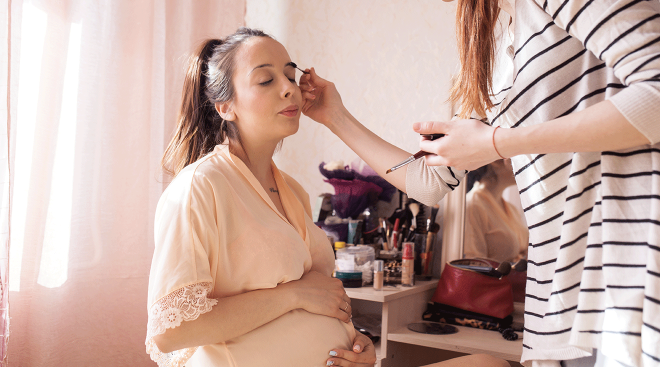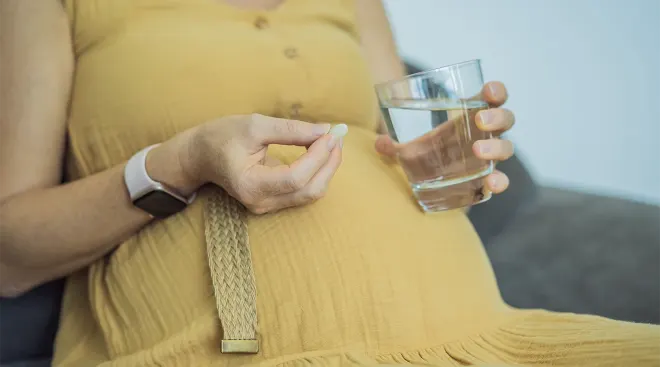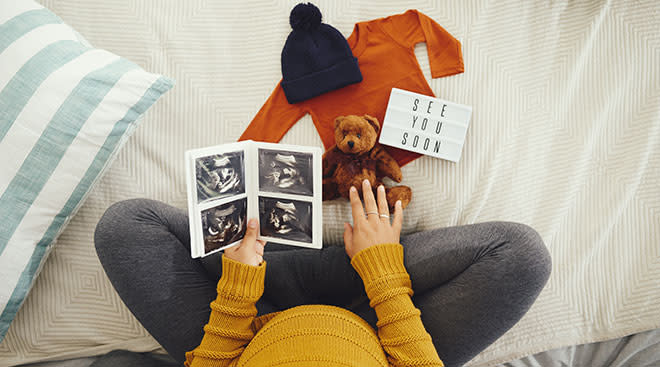- Guess what? Fertilization has just occurred. Yes, that means you’re officially pregnant—you probably just don’t know it yet!
- What’s on the cusp of happening next? Implantation! If you notice a little bit of spotting, it might be an embryo burrowing itself in your uterus. Then again, you may not experience any bleeding or you might think it’s your period.
- If you’ve been trying to get pregnant, then you’ve likely started making some lifestyle changes. If not, there’s no time like the present. Make sure you’re taking a prenatal vitamin, getting moderate exercise and avoiding alcohol.
Sperm met egg last week, and voila—you've made a baby! It’s so early that when you’re 3 weeks pregnant, you may have no idea that you’re actually pregnant. Conception just happened a few days ago, and there probably hasn't been time for you to miss a period yet at week 3 of pregnancy.
Your now-fertilized egg (yay!) is on a journey through a fallopian tube, dividing and re-dividing into identical cells on its way to your uterus.
3 week ultrasound
At 3 weeks pregnant, an ultrasound may not detect your soon-to-be-baby. That super-teeny fertilized egg (called a morula) is smaller than a grain of salt and is on the move, but as early as week 4 your doctor may be able to see your uterine lining get thicker, a sign that the little morula has reached their destination for the rest of pregnancy (you guessed it: your uterus).
When you’re 3 weeks pregnant, symptoms may not have appeared yet. That’s because most early pregnancy symptoms are caused by pregnancy hormones, and you probably don’t have a very high level of those in your body yet. (Oh, but you’ll get there!) Some signs of pregnancy at 3 weeks—and the few weeks following—are:
Implantation bleeding
If your little soon-to-be-embryo has already made it to their new home, you may see a bit of spotting as the fertilized egg burrows into the lining of your uterus.
Nausea
As the pregnancy hormone hCG begins to make its way through your newly pregnant body, you may notice some feelings of queasiness—or nausea so bad it makes you puke. Morning sickness should really be called all-day sickness since it doesn’t discriminate by time of day. If you’re feeling this symptom of pregnancy at this point, you may be further along than you thought. (Or you may even be 3 weeks pregnant with twins! That’s because twin moms-to-be often have higher levels of pregnancy hormones and therefore worse nausea.)
Breast changes
Your breasts can start to get sore and your nipples may darken as your body starts prepping to make milk.
Missed period
If your cycle is typically shorter than 28 days, you may realize toward the end of this week that you could be pregnant. The only way to know for sure is to take a pregnancy test.
Positive home pregnancy test
Check the box of your home pregnancy test to see how accurate its results are before your missed period. Most are over 99 percent accurate once you’ve missed it, and some brands promise to detect pregnancy hormones in your urine sooner than that. (For example, when you’re 3 weeks 5 days pregnant or even 3 weeks 4 days pregnant.) Here’s the thing: The amount of pregnancy hormone hCG in your body might not be enough for the test to detect right away—but it doubles every 48 hours. If you get a negative result, follow up a few days and then a week later with another pregnancy test and then another, to be sure it wasn’t just too early to tell.
Positive blood pregnancy test
In some cases—like if you’re at risk for miscarriage or ectopic pregnancy—your doctor may ask you to come into the office for a blood draw. Blood tests can detect smaller amounts of hCG than urine tests can, so you may find out that you’re pregnant sooner with a blood test than you would with an at-home test.
Can you tell you’re pregnant at 3 weeks?
While some people feel no difference at all at this early stage, others may start to notice 3 weeks pregnant symptoms. The experience at 3 weeks pregnant can really vary, so don’t fret if you don’t feel anything out of the ordinary. However, if you feel nauseous and your breasts are sore, that’s normal too. Everything changes quickly in early pregnancy, so no matter how you feel, be prepared to feel different in a week!
You may be excited to start noticing something different about your appearance, but at 3 weeks pregnant, a belly isn’t really a thing. Though you may feel a bit bloated, most pregnant women don’t start to show until around week 12 or later, so you’ve got quite a way to go before you actually look pregnant.
Before you start eating for two, know that doctors only recommend most women gain one to five pounds total in the first trimester—that’s the first 13 weeks. So you definitely don’t have license to start majorly indulging at this point. In fact, you shouldn’t really do anything different except try to eat a healthy, well-rounded diet and take a daily prenatal vitamin with at least 400 micrograms of folic acid in it. Doctors don’t recommend increasing your daily calorie intake until the second trimester. Once you hit week 14, you’ll want to add about 300 (healthy) calories per day.
How many weeks are you at implantation?
Implantation occurs soon, at about 4 weeks pregnant. For implantation to happen, the cells in the fertilized egg, now a morula, will continue to divide until it becomes a blastocyst. About five to eight days after fertilization, the blastocyst will have arrived, where it will begin to implant in the wall of the uterus. What a journey!
Pregnancy tests have come a long way and can even detect pregnancy before you’ve missed your period. That can work for you and also against you. For the truest result, I'd recommend testing a few days after you’ve missed your period with first morning urine. If negative and still no period, repeat this process every two to three days—always first thing in the morning.
Trying to conceive can be daunting, and perpetually wondering if you’re expecting can further cause stress. Here’s what you can do to prioritize your physical and mental health.
Be patient
First things first: You’re probably chomping at the bit to officially find out that you’re pregnant, but be patient. A pregnancy test might not be able to detect a pregnancy just yet. Wait until the test you’ve purchased says it can detect a pregnancy—probably at the end of the week. Once you start testing, if you get a negative result, feel free to keep testing every couple days until you get your period.
Ace that test
When it’s time to take the pregnancy test at the end of the week, take it first thing in the morning. Your first morning pee is the most concentrated, making it the most likely to have a high enough concentration of hCG for the test to detect. Follow the directions exactly for the most accurate results.
Continue taking care of yourself
You should still be taking your prenatal vitamins every day, drinking plenty of water and eating healthy, balanced meals. Continue to get regular moderate exercise and practice self-care.
Eat well
Focus on foods that are high in calcium and iron to help support the extra blood your body is making. If you’re nauseous or vomiting, try making ginger tea, drinking some clear broth or eating a banana (yay, potassium!). Even ice cream can be a good compromise when you’re struggling to eat but still need protein and calcium. Make it a banana split with a few nuts and you’re covering your bases pretty well!
Frequently Asked Questions
What does a faint line on a pregnancy test mean?
Getting a faint line on a pregnancy test can be frustrating—and confusing. Pregnancy tests detect the hormone human chorionic gonadotropin (hCG). Because of this, even a faint line usually means you’re pregnant. It could be that you’re early on in your pregnancy and hCG levels are low, which can lead to that faint line. It might also be the case that the test you used isn’t particularly sensitive. In some cases, it may be that you’ve experienced an early pregnancy loss. (The only way to have more insight is to test yourself again again in a few days and see if the line gets darker or lighter.) There’s also the chance that you’re looking at an evaporation line, which can happen if you check your test results after the recommended time interval. That line could be the ink getting caught in the urine line and appearing after the urine dries.
Can prenatal vitamins upset my stomach?
Unfortunately, yes, prenatal vitamins can upset your stomach. There are a few things you can try if you’re feeling queasy or sick after taking your vitamins. For starters, try taking your vitamins with food—this can ease digestion. You can also try taking your vitamins at a different time, like bedtime. If that doesn’t help, consider trying a different formulation, including asking your doctor about prescription prenatal vitamins that can be gentler on the stomach. You may also want to consider taking a prenatal vitamin without iron and taking an iron supplement separately in split doses, since iron can irritate your stomach. If all that fails, talk to your healthcare provider about next steps.
What are the different types of home pregnancy tests?
You have a lot of options when it comes to choosing a home pregnancy test. All home pregnancy tests look for the presence of the hormone human chorionic gonadotropin (hCG) in your urine, but there are different styles available. Dye pregnancy tests are strips or wands that you either pee directly onto or dip into a container you’ve collected of your pee. If the test detects hCG in your urine, it’ll spark a chemical reaction that causes a positive test line to appear. Digital tests are simple to read—they will say “positive” or “negative,” or show a plus or minus sign. They’re user friendly and easy to interpret, but they may be less sensitive to hCG.
How can I distinguish between PMS and early pregnancy symptoms?
Every person’s experience with PMS and early pregnancy is different, and not everyone will have the same symptoms with either one. That said, there are a few clues that you may be dealing with one over the other. PMS symptoms usually happen in the days leading up to your period, while early pregnancy symptoms start around the time you missed a period or soon after. PMS symptoms also usually get better around the time you start your period. Both PMS and early pregnancy can cause sore breasts but it tends to be more intense and persistent when you’re in early pregnancy. You can even end up having nausea and vomiting in PMS and early pregnancy, although it tends to be more common and severe in early pregnancy. Food cravings can happen with both PMS and early pregnancy, but you’re more likely to experience food aversions in early pregnancy.
When will I go for my first prenatal appointment? What can I expect?
Every medical and midwife practice is different, but many will schedule your first prenatal visit for when you’re around seven to eight weeks along. This is when an ultrasound is likely to detect baby’s heartbeat, which typically can be seen as early as six weeks. However, if you’ve had pregnancy complications in the past, your healthcare provider may recommend that you be seen earlier than seven to eight weeks. During that visit, you may be given an ultrasound to confirm the pregnancy, along with having blood and urine testing. Depending on when in your pregnancy you’re seen, your provider may suggest genetic testing. They’ll also talk to you about lifestyle factors, like avoiding smoking, alcohol and certain foods. You can expect a physical exam during this time, too.
I bought every test on the store shelf. Strips, dips, digital, you name it. It was like a scene out of a sitcom. I needed a definitive answer—over and over again.
Please note: The Bump and the materials and information it contains are not intended to, and do not constitute, medical or other health advice or diagnosis and should not be used as such. You should always consult with a qualified physician or health professional about your specific circumstances.
American College of Obstetricians and Gynecologists, Morning Sickness: Nausea and Vomiting During Pregnancy, December 2021
American Pregnancy Association, 3 Weeks Pregnant
American Pregnancy Association, 12 Weeks
American Pregnancy Association, Are You Pregnant?
American Pregnancy Association, Diet During Pregnancy
American Pregnancy Association, Early Fetal Development
American Pregnancy Association, Folate and Folic Acid When Pregnant
American Pregnancy Association, Pregnancy Nutrittion
American Pregnancy Association, Pregnancy Tests
American Pregnancy Association, Pregnancy Weight Gain
Centers for Disease Control and Prevention, Planning for Pregnancy, February 2023
Cleveland Clinic, Am I Pregnant?, July 2022
Cleveland Clinic, Fetal Development, March 2023
Cleveland Clinic, Pregnancy Tests, November 2022
March of Dimes, Pregnancy Week by Week
Mayo Clinic, Fetal Development: The 1st Trimester, June 2022
Mayo Clinic, Is Nausea During Pregnancy a Good Sign?, October 2021
NPR, The Surprising Science of How Pregnancy Begins, April 2023
Planned Parenthood, Pregnancy Tests
Planned Parenthood, Month by Month
Planned Parenthood, When do Pregnancy Symptoms Start?, June 2020
UNICEF, What to Eat Before, During and After Pregnancy
Learn how we ensure the accuracy of our content through our editorial and medical review process.
Navigate forward to interact with the calendar and select a date. Press the question mark key to get the keyboard shortcuts for changing dates.














































